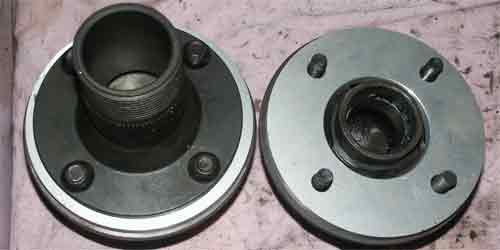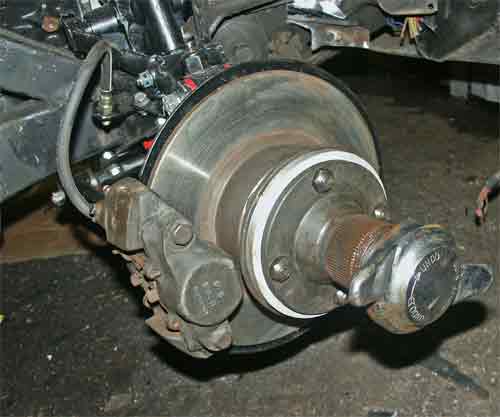
It’s hard to beat the elegant good looks
of chrome wire wheels. This probably
explains why they were fitted to
so many of our favorite classics, although
many more cars left the factory without
wire wheels than with them.
Fortunately, it’s often a simple matter
to convert cars to run on these wheels,
especially if the cars came with wires …
Read the rest of the story

wspohn
SuperDork
6/27/16 4:41 p.m.
You said that you either need to cut the wheel studs down or press in shorter ones. You missed one. Simply use a thin spacer the thickness of which equals the amount you'd need to cut down the studs. These are Triumph wire wheel adaptors on MGB hubs (fitted to an MGA, but that isn't relevant) with such spacers. 

PS - you might also want to note that you need to use special shallow wheel nuts so the adaptors don't cause the wheels to bottom on the nuts instead of the bevel on the adaptors (regular wheel nuts hit the inside of the wire heel rim)

bkwanab
New Reader
2/2/21 11:49 a.m.
I think I would have invested in some new brake rotors before spoked wheels. The ones shown in the article are severely rust pitted. I assume that will be addressed in a later article.
On another cautionary note, it's worth mentioning that chromed spoked wheels are more liable to breakage than the painted ones shown in the article. The process of chroming can cause the hard chrome to be deposited in the smallest flaws that will then become bigger flaws over time. I don't know if this is still true but in Britain chromed spoked wheels were not permitted on cars to be raced because of their potential for failure under heavy cornering loads. The shiny Borranis used on the vintage racing cars used polished alloy rims with stainless spokes, not chrome.
I heard that rumor. But I used chrome wire wheels on my Jaguar based race car. 155mph into turn 5 ( about 35?mph ) brake rotors glowing red from eating all that energy in such a short distance. Dunlop racing tires chewing up rubber at Road America often sliding sideways.
Raced all over the country and the Bahama's. From 1976- 2015. Those are the original wheels on the Black Jack Spl. Sitting in the Packard museum.
Nope not a broken spoke. In fact I never had to even tune them.
By the way Jaguar wire wheels are all chrome. Right from the factory. That's a real 150 MPH potential car.
In reply to David S. Wallens :
You can even adapt chrome wire wheels to some cars that never had wire wheels. MSW ( motor Sport wheels) offers adapters for Morris Minors, and several other cars. You haven't seen anything until you see a Morris Traveller ( the woodie ) With those flashing in the sun lite.
However Dayton wire wheels offers a variety of sizes of wire wheels including 18"&20" and knock off adapters ( Rudge 54 ) for heavier cars. They go up from the standard 72 spoke to 100 spoke wheels though. The nice thing about Dayton wire wheels is they are true tubeless wheels.
Wheel King is another supplier of wire wheels especially for American cars. Again they use a knock off style hub. But they are not suitable for Jaguar hubs ( Rudge 54's)
Chrome plating can cause hydrogen embrittlement. There's no cost effective, non-destructive test for hydrogen embrittlement and not all chrome platers have the facilities to perform the post plating heat treatment required for mitigation. As a result most sanctioning bodies don't allow chrome plated roll bars. Wire wheels were before my time but I suspect that the roll bar tabo was just carried over to wire wheels. There's no reason why a wheel company couldn't produce chrome plated wire wheels that were properly post processed and completely safe. In fact, I'd expect any reputable company to do just that.

wspohn
SuperDork
2/3/21 10:54 a.m.
FWIW the Dayton chrome wires actually use stainless steel spokes and only chrome plate the rims in order to avoid any embrittlement issue.

bkwanab
New Reader
2/6/21 10:14 a.m.
In reply to frenchyd :
I suppose the painted E Type Mk1 wheels below are Scotch mist then.


Jaguar did not supply only chromed wire wheels on any model. Chrome wires were an option but I suspect may have been installed on export cars to America, increasing the profit margin and satisfying the flashy types.

wspohn
SuperDork
2/6/21 10:43 a.m.
BTW, Zenith Wire Wheel (now called Wire Wheel King) in California made wire wheels that fit American cars. They used a serrated adaptor that bolted to the hubs and the inside of the wheel had matching serrations that locked them in place. North American Jensen dealers offered them as a dealer option in North America. I've never used them as I prefer the stock alloys.
In reply to bkwanab :
Personally, I love painted wire wheels, but don't care for chromed wire wheels on many cars. They look garish to me.
What do those California Low Riders use ?
Where do they get them ?
Chrome too garish, how about Gold ;)
BritishWireWheels.com is another great source for wire wheels and conversion splined hubs - sourced from MWS in England (just like Moss).
NOTE: bolt-on splined hubs increase the track of your car @1.25" per corner (and with a spacer behind them, that much more), so take this in to consideration when choosing your tires so you don't run into rubbing issues.
Dave
I like knock-offs , just this style from a Mercedes 300 SL
Anyone considering a wire wheel swap should carefully consider any weight difference between the stock wheels and the contemplated wire wheel/hub weights. The bolt-on Dayton wires I installed on my '67 Volvo 1800S a few years ago were about 50% heavier than the stock steel wheels. With the same tires, the added weight of the wire wheels significantly increased my suspension's unsprung weight and, as a result, degraded the car's roadholding, handling, and ride characteristics. I replaced the wires with an equally beautiful set of lightweight Panasports, at about a 30% weight savings compared to stock. The resultant handling and ride character was vastly improved in comparison to the stock setup. Wires are beautiful, but if handling is a priority, then considering the affects of unsprung weight changes ought to be a concern.







































